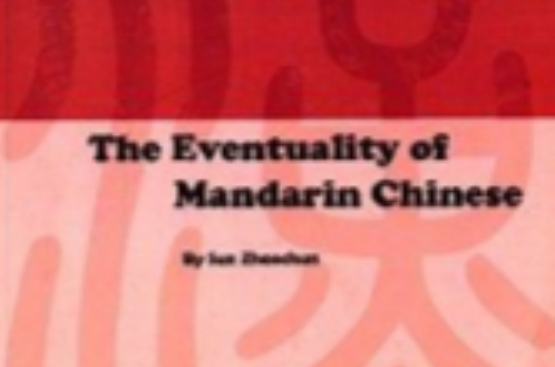《漢語事件結構研究》探討了體在漢語中的表達形式。研究認為,漢語的狀態體和行為體是在詞庫中表達的,而完成體和完結體是在句法層面表達的,這種差異是由於漢語動詞缺乏時間結點所造成的。本研究對於理解漢語體的表達形式和語言間的差異具有重要意義。《漢語事件結構研究》的主要研究問題是漢語如何表達完成體和完結體。作者運用了大量例句及大量圖示來展示其研究工作,結論是漢語中的完成體和完結體是通過句法手段來完成的。
基本介紹
- 書名:漢語事件結構研究
- 作者:孫肇春
- 出版日期:2013年7月1日
- 語種:簡體中文, 英語
- ISBN:9787566805898
- 外文名:The Eventuality of Mandarin Chinese
- 出版社:暨南大學出版社
- 頁數:178頁
- 開本:16
- 品牌:暨南大學出版社
內容簡介
圖書目錄
Abstract
Introduction
Chapter One Approaches to Eventuality: A Review
Introduction
1.1 Vendlerian Aspectual Classification of Verbs
1.1.1 General Introduction to Vendler's Aspectual Classes of Verbs
1.1.2 States
1.1.3 Activities
1.1.4 Accomplishments
1.1.5 Achievements
1.1.6 Summary
1.2 Lexical Decompositional Approach to Eventuality
1.2.1 Generative Semantic Approach
1.2.2 Categorical Approach
1.2.3 Lexica) Syntactic Approach
1.2.4 Syntactic Approach
1.2.4.1 Huang (1991, 1997)
1.2.4.2 Lin (2001)
1.2.4.3 Comments on Huang (1991, 1997) and Lin (2001)
1.3 Chomskyan Light Verb
1.3.1 Origin of the Chomskyan Light Verb
1.3.2 Development of the Chomskyan Light Verb
1.3.3 Some Semantically—Richer Light Verbs
1.3.3.1 Bowers' (1993) Pr
1.3.3.2 Kratzer's (1996) Voice
1.4 Summary
Chapter Two Eventuality and Lexical Aspect in MC
Introduction
2.1 Eventuality and Aspectual Classes of Verbs in MC
2.1.1 Previous Studies on Eventuality in MC
2.1.1.1 Early Period
2.1.1.2 Modern Period
2.1.1.3 Summary
2.1.2 Aspectual Classes of Verbs in MC
2.1.2.1 Previous Studies
2.1.2.2 Classification
2.1.2.3 Event Structure of Verbs
2.1.2.4 Summary
2.2 Eventuality of State in MC
2.2.1 Stative Adjectives in MC
2.2.1.1 Properties of Adjectives in MC
2.2.1.2 Gradable Adjectives
2.2.1.3 Non—gradable Adjectives
2.2.1.4 Contrast Between Gradable and Non—gradable Adjectives
2.2.1.5 Event Structure of Stative Adjectives
2.2.1.6 Summary
2.2.2 Stative Verbs in MC
2.2.2.1 Classification of Verbs in MC——Previous Studies
2.2.2.2 Properties of Stative Verbs in MC
2.2.2.3 Event Structure of Stative Verbs
2.2.2.4 Unaccusative Verbs
2.3 Eventuality of Activity in MC
2.3.1 Properties of Activity in MC
2.3.2 Event Structure of Activity
2.3.3 Summary
2.4 Conclusion
Chapter Three Eventuality of Achievement in Mandarin Chinese
Introduction
3.1 Previous Studies on Achievement in MC
3.2 Verbs of Achievement in English and MC——A Comparison
3.3 Achievement or Accomplishment?
3.3.1 Achievement vs.Accomplishment in English
3.3.2 Achievement vs.Accomplishment in MC
3.4 Achievement and Aspect Markers
3.4.1 Achievement and Aspect Marker le
3.4.1.1 Introduction to Aspect Marker le
3.4.1.2 Deriving Achievement with le
3.4.1.3 Summary
3.4.2 Achievement and Aspect Marker dad
3.4.2.1 Introduction to Aspect Marker dad
3.4.2.2 Deriving Achievement with dad
3.4.2.3 Interaction Between dad and Other Aspect Markers
3.4.2.4 Summary
3.4.3 Achievement and Aspect Marker zhao
3.4.3.1 Introduction to Aspect Marker zhao
3.4.3.2 Deriving Achievement with zhao
3.4.3.3 Interaction Between zhao and Other Aspect Markers
3.4.3.4 Summary
3.4.4 Achievement and Aspect Marker qilai
3.4.4.1 Introduction to Aspect Marker qilai
3.4.4.2 Adjectives and qilai
3.4.4.3 Verbs and qilai
3.5 Conclusion
Chapter Four Eventuality of Accomplishment in Mandarin Chinese
Introduction
4.1 Accomplishment and Aspect Markers
4.1.1 Previous Studies on Accomplishment and Aspect Markers
4.1.2 Accomplishment and le
4.1.3 Accomplishment and Other Aspect Markers
4.1.4 Summary
4.2 Accomplishment and Resultative Verbal Constructions (RVCs) in MC
4.2.1 Classification of RVCs
4.2.2 Types of Literal RVCs
4.2.3 Types of English Resuhative Constructions
4.2.4 Event Structure of RVCs
4.2.4.1 Previous Studies on the Derivation of RVCs
4.2.4.2 Accomplishment Event Structure Approach——Our Proposal
4.2.4.3 Ambiguity of Accomplishments
4.2.4.4 Accomplishment Event Structure Approach to DE Constructions
4.2.4.5 Accomplishment Event Structure of ERCs
4.3 Conclusion
Chapter Five Concluding Remarks
Appendix: List of Abbreviations
Bibliography
Acknowledgements

